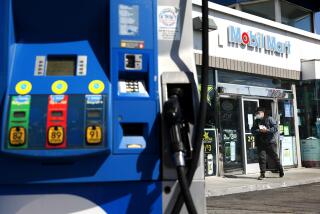Cheap gas is not good news for those who worry about climate change
It seems as if low gas prices should be good news. When the cost of a gallon of gas dips well below $3 in most of the country, everybody smiles, right?
Not necessarily. Wall Street is frowning. Frackers are fuming. Electric car manufacturers are fretting. And environmentalists are freaking out. And the rest of us? It’s a mixed bag, depending on how invested we are in the stock market, how much we want to own a Tesla, how gung-ho we are to see the Keystone XL pipeline built or how much we believe climate change is big problem for humanity.
In recent days, stocks have slumped as crude oil prices have continued a six-month descent. Investors do not like to see oil companies and drillers lose money and worry about the international market where cheap gas is coming at a high price for Russia, Saudi Arabia and other oil producing countries.
Wall Street’s worries may not last long, though, because the extra cash going into consumers’ pockets thanks to savings at the pump is bound to be spent somewhere else in the economy. When that happens, stocks will bounce back.
For Keystone backers, though, the situation may be more dire. Next month, when Republicans take full control of Congress, there will probably be veto-proof majorities in both houses that can force the Obama administration to finally approve the pipeline project that would carry oil from Alberta’s tar sands to Gulf Coast refineries and ports. However, hosannas are not echoing through the oil industry just yet. Oil industry experts are saying low gas prices may have made the pipeline financially untenable.
Extracting the tar sands oil through hydraulic fracking is not a cheap process and, with oil selling at a five-year low, what once looked like a money-making venture now seems, at best, a break even deal. One Texas-based energy analyst told the Los Angeles Times, “The economics of this project are becoming increasingly borderline.”
Nevertheless, Republicans plan to push for pipeline approval in January. GOP senators, such as Oklahoma’s Sen. James Inhofe, insist gas prices are irrelevant. What goes down is bound to go back up, Inhofe says, and, sooner or later, the pipeline will pay off.
Maybe, in a traditional market, that would be true, but, right now, the Saudis, who once were the guarantors of price stability, are not slowing their own pumps to limit supplies and boost prices. Instead, they are pumping like crazy – and losing money doing it – because they are desperate to undercut the booming American shale oil industry that has made the U.S. the world’s number one producer of liquid petroleum. The Saudi’s fight to maintain primacy in the oil market could keep gas prices low for much longer.
So, for Wall Street investors and oil producers, low gas prices are not good news, but they’ll get over it. For environmentalists, however, there is nothing but gloom. Sure, they’d be ecstatic if Keystone gets cancelled, but their glee will be momentary. The low gas prices that could scuttle the pipeline will also steer consumers away from electric and hybrid cars, smaller vehicles and mass transit. Lower-cost fossil fuels will mess with the economic viability of alternative energy businesses. Ultimately, cheap gas means more CO2 in the atmosphere, more melting glaciers, more sea levels rising and more climate extremes making life on Earth much less pleasant.
Other than that, cheap gas is great news. Happy driving!
More to Read
A cure for the common opinion
Get thought-provoking perspectives with our weekly newsletter.
You may occasionally receive promotional content from the Los Angeles Times.







